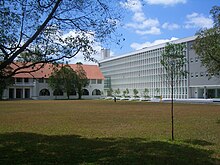|
National University of Singapore Faculty of Law
The National University of Singapore Faculty of Law (NUS Law) is Singapore's oldest law school. NUS Law was initially established in 1956 as the Department of Law in the University of Malaya, and subsequently, University of Singapore. After its establishment, NUS Law was Singapore's only law school for half a century, until the subsequent establishment of the SMU School of Law in 2007 and the SUSS School of Law in 2017. NUS Law is currently located at the NUS Bukit Timah Campus.[1] The current dean of NUS Law is Andrew Simester.[2] Internationally, NUS Law has been ranked twelfth by the QS World University Rankings by Subject in 2024 and eleventh by the Times Higher Education World University Rankings by Subject in 2024.[3][4] History   After its establishment in 1956 as the Department of Law of the University of Malaya, NUS Law attained faculty status in 1959, and Lionel Astor Sheridan was appointed as its founding dean. Its pioneer batch of students graduated in 1961, featuring future notable figures such as Chan Sek Keong and Tommy Koh. After the division of the University of Malaya in 1962, the faculty continued as part of the new University of Singapore. Subsequently, the faculty became part of the National University of Singapore which was formed in 1980 by a merger between the University of Singapore and Nanyang University.[5] Undergraduate programmesThe LL.B. programme at NUS Law is a four-year programme. Students take compulsory modules in their first two years and elective modules in their third and fourth years. In terms of exposure to non-law subjects, students may choose to take non-law elective modules offered by other NUS faculties, read for minors outside of law, and take on concurrent or double degree programmes.[6] Undergraduate students may go on exchange to study in a law school in a foreign jurisdiction. Students on the exchange programme pay only tuition fees at the NUS Law rate. Selected students can also combine completion of their LL.B. at NUS Law with an LL.M. from a partner institution in four years.[7] The indicative grade profile of the tenth percentile of GCE A-Level applicants offered places in its LL.B. programme in 2020 was AAA/A.[8] Applicants are required to sit for a selection test and attend a formal interview to assess their suitability for the study of law.[9] Graduate programmesFor graduate students, NUS Law offers a J.D. programme, several coursework LL.M. programmes, and a research Ph.D. programme. Admissions for graduate programmes generally require a good bachelor's degree in law.[10] PublicationsNUS Law publishes the Singapore Journal of Legal Studies, one of the oldest law journals in the Commonwealth.[11] It also produces the Asian Journal of International Law (which is published by Cambridge University Press and succeeds the Singapore Year Book of International Law),[12] and the Asian Journal of Comparative Law (also published by Cambridge University Press).[13] Additionally, the Singapore Law Review,[14] which is Asia's oldest student-run legal publication, is managed exclusively by the students of NUS Law. CentresNUS Law hosts the following centres:[15]
In addition, NUS Law also hosts the Secretariat of the Asian Society of International Law (AsianSIL).[18] DeansThe deans of NUS Law from 1956 to present are listed below:[5]
Notable alumniNUS Law has produced a number of notable alumni, including Senior Counsel, Attorneys-General, Members of the Singapore Parliament, Ministers of the Cabinet of Singapore and Judges of the Supreme Court of Singapore: Academia
Arts
Business
Judicial
Public service
Politics
References
External linksWikimedia Commons has media related to Faculty of Law, National University of Singapore. |
||||||||||||||||||||||||||||||||||||||||||||||||||||||||||||||||||||||||||||||||||||||

